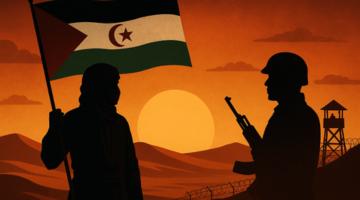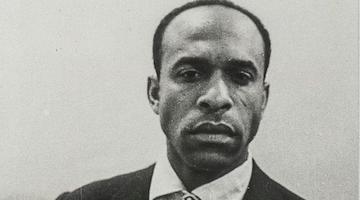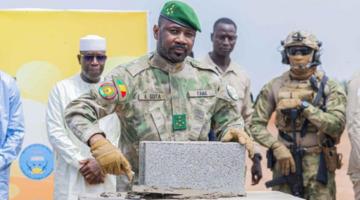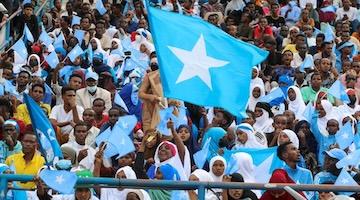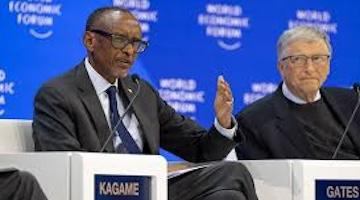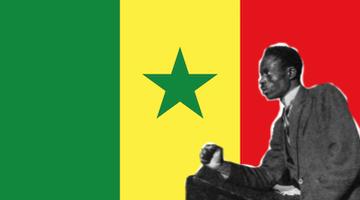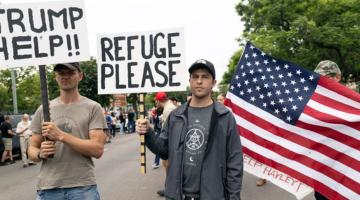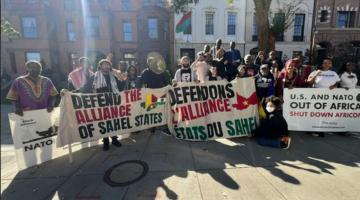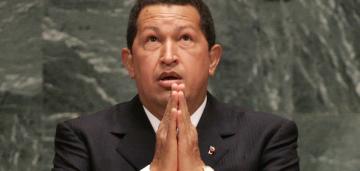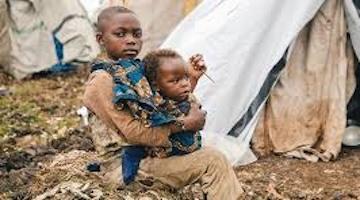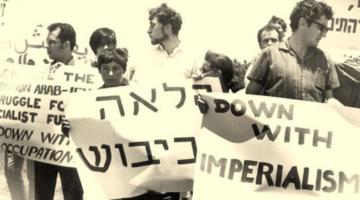Eugene Puryear, fourth from left, with comrades at the Conference in Solidarity with the Peoples of the Sahel in Niamey, Niger.
I spoke to Eugene Puryear, who traveled to the November 2024 Conference in Solidarity with the Peoples of the Sahel.
Between 2021 and 2023 West Africa saw three popular military coups. Assimi Goïta became the president of Mali in 2021, Ibrahim Traoré became the president of Burkina Faso in 2022, and Abdourahamane Tchiani, became the president of Niger in 2023. The three former French colonies expelled French and US military and media. They withdrew from ECOWAS, the Economic Community of West African States, and confederated, forming the Alliance of Sahel States. In French, that's the Alliance des États du Sahel (AES). They announced their intention to cooperate on regional security, integration, sovereignty, and economic independence.
In January, they announced a common passport, and in February, they raised a common flag. In March, Togo signaled its intent to leave ECOWAS and join the landlocked Alliance, giving it access to the sea. There's talk of Senegal and other bordering states following suit.
I spoke to Eugene Puryear, author, journalist and Breakthrough News host, who attended the November 2024 Conference in Solidarity with the Peoples of the Sahel.
ANN GARRISON: Eugene, could you talk about how the Alliance of Sahel States and its three members have moved to free themselves from neoliberalism and French neocolonialism?
EUGENE PURYEAR: I appreciate the question and, when we look at all three countries in the Alliance for Sahel States, we can maybe sum it up by saying that they are reclaiming their sovereignty, challenging neocolonialism, and rearranging the economic setup that previously meant that, despite living in very resource-rich countries, mineral-rich in particular, the people there were extremely poor. They’re turning that pyramid on its head, so that the vast majority of the country’s wealth is no longer extracted by people who live outside the country and an elite sliver of people inside the country. They’re changing a range of policies to make sure that the wealth that comes from under the soil and from the labor of its people is more broadly distributed amongst the people.
AG: The nations of the confederation have nationalized key resources and moved to escape from the neocolonial extractive economy trap. Could you talk about that?
EP: Absolutely. The mineral wealth of Mali, Burkina Faso, and Niger includes uranium, gold, lithium, and iron ore, all things that make modern society run and glitter in the First World countries of Europe and the United States. They are also exporting agricultural products, but minerals are their greatest source of wealth. It’s been extracted without benefit to the people of the confederation because the vast majority of the companies who possess the technology needed to extract minerals from the ground are from the developed world. They come from Europe, China, Turkey, and other places. So you have, on the one hand, foreign companies looking to maximize profit, and they have been able to set unfavorable terms.
The Sahel States are now refusing those terms, demanding not only higher taxes on wealth extracted, but also joint ventures where they are getting a percentage of the overall value of the company. Instead of just levying X amount in taxes, they may demand 20% or more of the company. It’s different in each situation, but the bottom line is that they’re demanding an equity share.
You can look at a country like Mali, which in just the past year or so has reclaimed about $500 million in tax revenues that were being lost in past years, which gives you a sense of how bad the situation was. In addition to having low tax rates, foreign corporations were also just not paying taxes. That should give you a sense of the scale of these changes. They're bringing in hundreds of millions of extra dollars a year, just by increasing the amount that foreign corporations have to pay in taxes, and also by increasing or putting more joint ventures in place where the government has a larger share and ownership of the company, and thus distribution of the profits and dividends.
AG: How did Mali reclaim the $500 million in tax revenues? Was there a legal process?
EP: Mali claimed they were unpaid tax revenues. Although most of the companies at issue denied that was the case and said they were not evading taxes. But Mali put a number of executives in prison and were then able to come to agreements with a number of companies. So there wasn’t much of a legal process, more of a “pay or your executives stay in jail.”
AG: What about attempts to industrialize, developing a more complex division of labor, more skills, and thus a wealthier society?
EP: Yes, you can see these countries trying to move up the value chain in exactly the way you are describing. In Mali, for instance, they've built one of the world's largest lithium mines, but not just to mine it. They’re also starting to complete the initial stages of refining lithium after it comes out of the ground.
In Burkina Faso, they're starting to build gold refineries so that gold doesn’t just leave without added value and without employing Burkinabes.
These countries are also starting to industrialize to add value to agricultural products. In Burkina Faso, the president inaugurated a facility that'll be able to make flour from wheat and other forms of grain, so that they'll be able to import less flour and make more of their own bread and other basic foods inside of Burkina Faso, not depending on imports. They also grow a lot of tomatoes in Burkina Faso, but they were not producing ketchup or tomato sauce. Now they're producing and exporting both.
So you can see all across the mineral, agricultural, and oil industries that these countries are trying to add value instead of just exporting raw materials for others to turn into commodities and sell back to them at high cost.
AG: Most of all, the Sahel States need to escape from the tyranny of the CFA franc, which traps them in French financial structures. What do you think of the prospects for that?
EP: Well, I think the prospects are higher than they were before the creation of the Alliance of Sahel States. I mean, it's a conversation that is very much on the lips of people there. I know there have been official conferences, even held by different governments at different times, where they've brought together experts to talk about it. It's certainly the direction those countries want to go in. But launching a new currency is obviously challenging, because you have the issue of what's going to back the currency. Then there are the challenges of rearranging your economy and being prepared in the correct way when you introduce a new currency, especially one that you know floats, instead of the CFA franc, which is pegged to the Euro.
So you have different central bank pieces. And a lot of those central banking functions are collectivized because of the CFA franc across a range of West African and Central African countries. You have the West African CFA Franc and the Central African CFA franc. So you have the combination of all these factors. To unravel yourself from that is not just a light switch.
I think at this stage the Alliance of Sahel States is not ready to move aggressively on a currency reform but should start to move deliberately in that direction. It’s about starting the conversation of the mechanics of what it looks like, laying the groundwork and making it sustainable over time. As these economies continue to develop and grow, it becomes more of a possibility.
If they move too fast, it could become a destabilizing factor in the overall economic growth that we're seeing. And we are seeing a lot of growth.
I watched an interesting video from, I think, Senegalese TV, in which they went to a market in Burkina Faso. They were asking people how it’s going under the new government, and people were saying that the markets are booming and they’re selling all their goods, and that security protecting them from terrorism is making it easier for them to trade. So you can see that new government policies are starting to have an impact, but ultimately, they're going to have to address the CFA franc.
AG: Western elites are, of course, concerned about Russian influence. What do you think of how the Sahel States Alliance is situated in the new Cold War?
EP: The Alliance of Sahel States are one of the front lines in the New Cold War, but through no fault of their own. They had a critique of development and security cooperation with the US and France, but at no time did they ever say that they wanted to sever all relations with these or other Western countries. They just said that they wanted to be sovereign and be able to dictate more of the terms of their engagement, and that was something that France was especially unwilling to do.
So, ultimately, in that context, we've seen the Alliance of Sahel States pursue different security partnerships by working more with Russia in the struggle against ISIS- and Al Qaeda-linked groups. They’ve also deepened their relationships, which were already relatively strong, with countries in Asia and other parts of Africa, and, of course, with each other.
France had been there for decades, but the Sahel was still wracked by violence and terrorism. This became a motivating factor in the popular military coups that put the current governments in power. They had to switch teams basically because the alliance with France was not delivering security.
Many felt the security relationship with France was just enforcing France’s economic dominance, so they wanted a change, and Russia was the only option. The West has since demonized and punished them for making their own choices about who are the best partners for assuming their internal security and economic independence.
AG: Yesterday there was news that Niger had kicked out a Chinese mining company, telling them to pack up and leave in one day because they’d been exploiting workers, not paying taxes, and cheating the people in all the usual ways.
EP: Well, I'm not surprised. Niger, Mali, and Burkina Faso have really stressed that what matters is the letter of the law, no matter what countries or corporations are involved. They've penalized countries from China, Europe, and North America.
I don't think they're discriminating at all. They're just saying we have laws concerning workers rights, taxes, and our own development, and if anyone violates those laws, we are going to hold them accountable.
I will add that when you look at the sum total, Chinese companies tend to follow the rules when the rules are enforced, whereas Western companies tend to leave instead. In Eritrea, a lot of the mining companies are Chinese, and they’re following very strict rules. Orano, the big French uranium company, has just exited Niger after it demanded greater royalties. Western companies have a more coercive response to Africa’s demand for a greater share of its resource wealth.
As a friend of mine in Zambia says, Africa doesn't really have a China problem; it has a capitalism problem. The elites of many countries are 100% willing to overlook bad acts because they are themselves benefiting from the unequal extraction of resources. Companies from China, America, and Europe, are going to take advantage of that, but Chinese companies are more willing to play by the rules and work with countries like Eritrea, Zimbabwe, and now the states of the Sahel States Alliance.
The Chinese government also builds infrastructure and helps deliver healthcare and education, which Western countries are not doing in any way, shape, or form.
Why is the discourse in the West that we have to catch up with China? Did something go wrong here? Trying to catch up with China in terms of building airports, ports, railroads, hospitals, and schools?
AG: Okay, all three of the Sahel States have been fighting jihadi terrorists armed with the weapons that NATO introduced into North Africa when it destroyed the Libyan state. They've expelled the French and US military, who were claiming to fight the problem that they'd created. All three countries are now fighting jihadi terrorism on their own. I believe that 40% of Burkina Faso is under jihadi control. Do you think they have a better chance of winning these wars now that the French and US military are gone?
EP: I think so. I think when you look at the long engagement of the French and the US military, the problem was only getting worse.
When you look at what's happening now, you can see it's going up and down in different ways. It's still a mixed bag, but they are certainly fighting more aggressively, and I think they're also trying to fight more sustainably.
You mentioned Burkina Faso, where one of their main strategies is to engage more Burkinabe people and to have more of a popular mobilization against these various terrorist groups, as opposed to relying on outside forces.
And I think that people trying to reclaim their own land for their own development, in and of itself, will make the fight more meaningful. Various jihadi groups have been able to recruit because of the intense poverty that exists in these countries. When Mali’s revolution happened, all three of these countries had between 85% and 95% of people living on less than $7 a day.
There was a chronic lack of development and infrastructure.
So, for instance, jihadis may take over an area that has gold mines. They'll smuggle the gold out, then use the money to pay people who have almost no prospects.
Terrorism can also disrupt the transport of agricultural goods, making it hard to establish food sovereignty. So the struggle against terrorism is also a struggle for development
These countries are engaged in mass popular mobilizations, where the whole of a people are recognizing the connection between security and development, working together on a range of fronts.
AG: The Sahel States Alliance declared that they are breaking down unnatural borders created when European states carved up Africa at the 1885 Berlin Conference. At the same time, other African nations are at odds, or even at war, over reclaiming pre- colonial borders. Rwanda is carrying out a devastating war in the Democratic Republic of the Congo to re-establish what it claims are precolonial borders. In 2018, Ethiopia, Eritrea, and Somalia created a promising alliance, but now Ethiopia seems to be on the verge of going to war with either Eritrea or Somalia to establish what it calls precolonial access to the sea. Could you talk about this whole project of breaking down colonial borders?
EP: Yes. This became a major issue in the foundation of the Organization of African Unity in the 1960s, when they decided to respect colonial borders. These borders were drawn by colonizing powers, who did not consider critical African realities, but once they had been established for some time, people often developed a sense of nationality within them.
This created a tinderbox for wars and conflicts and power grabs. So the issue of uniting Africa, Pan-Africanism, and overcoming colonial borders has to be a voluntary, shared process, not a violent process. That's what's different with the Alliance of Sahel States. Here you have masses of people who were supporting these three popular military uprisings, as I call them, which had very similar roots. The poverty they suffered under French neocolonialism was essentially the same, and it wasn’t realistic to think they’d be able to lift themselves out of it alone. And so there needs to be more general Pan-African unity, not just between those three countries and others.
I think the question that has always bedeviled Africa is, how do we create a project? Since the 1945 Manchester conference, and some of the earlier Pan-African conferences, it has been widely recognized that in order to maximize their potential, African countries need more unity. They need to do it in a way that is sensitive to the realities of every region, that can be as voluntary as possible, and that doesn't evolve into warlord-based power grabs. That's a difficult and a challenging question.
As our mutual friend Elias Amare often says, China suffered 100 years of imperial humiliation, but Africa has suffered 500.
Think about the Chinese example. That was a huge question for those 100 years, where you had all these warlords and different people fighting to control the state or break it up in different ways. And they had to find their own path to unity. I think Africa is very much on that journey. Unfortunately, we have many tragic conflicts happening right now that I hope will end soon, but it's a part of that journey of figuring out how we create more popular-based, voluntary Pan-African projects like the Alliance of Sahel States.
AG: For anti-colonialists, anti-imperialists and socialists like ourselves, the Alliance of Sahel States may be the brightest spot on the planet right now. Many are very emotional about the need to defend it from inevitable destabilization schemes. So what was it like to attend the Conference in Solidarity with the Peoples of the Sahel in Niamey, Niger, last November.
EP: It was amazing. It’s hard to even describe. Most of the people attending were from Burkina Faso, Mali, and especially Niger, but there were also people from all around the continent. A couple thousand people convened there over a number of days.
We were fully immersed in civil society. That's the thing that we really started to see. There were people from this organization, or that trade union, this collective farm, or that political party, who had all come together, as they did in the huge protests to kick out the French that many of us saw on social media. These were not what we typically think of as a military coups because people were coming out in huge numbers to support the new leaders.
One individual who was maybe in his late 20s and spoke from the floor at the conference said he’d been voting every five years for politicians who promised to build roads, hospitals, and schools and then failed to. He said that what they need now is not to worry about the issue of formal democracy and voting, but to come together to build roads, hospitals and schools.
I was just reading an interesting interview with Niger’s Minister of Electricity, and he said that, in just two years, they've doubled access to electricity, and they’re trying, in five years, to provide electricity to three million people. Hundreds of villages are adding solar panels that will power health centers in rural areas that will be renovated with the money they're now getting from having more control over their own resources. To industrialize, you have to have electricity to run factories, and now you see all these things happening.
You see the power of the people, so to speak, that is really behind it. Here’s another quick example. In Burkina Faso, they're really trying to put more of a focus on the quality of produce, so that there's only good quality produce being found in the marketplaces. Recently, they found 60 tons of expired potatoes. But instead of just throwing them in the trash, they gave them to an organization that works on composting so they can produce organic fertilizer to sell and support their goal of having 30% of all of their arable land in agro-ecology, sustainable agriculture, by 2040.
That wheat factory I mentioned earlier created 300 daily jobs and 10,000 seasonal jobs. We also heard about people volunteering to come together to keep their cities clean.
The West says that they got rid of elections, but the fact is that there are small forms of small “d” democracy growing in so many ways all over these countries. I think we were able to see that at the conference in a way that was powerful.
And everywhere you go, the representations of the Alliance of the Sahel States are everywhere. It’s on the arm patch of Niger’s military, and now they have the Alliance of the Sahel States flag. They're renaming streets after anti-colonial heroes. We were at the Thomas Sankara Memorial, and there was a march in solidarity with Palestine, where we had people joining us from the streets of Niamey. There were so many cool moments, and it was so interesting. Change is happening in these countries in large and small ways, but it's adding up significantly.
AG: Okay, is there anything else you'd like to say?
EP: The one thing I’d add is that what’s happening in the Alliance of Sahel States is very threatening to the most powerful people, and we already saw them pressure the ECOWAS states to sanction them. Now, thankfully, those sanctions were defeated by and large, but the Sahel States are still in the crosshairs, and the crackdowns on the Palestine Solidarity movement, including the restrictions on free speech, could spread to them. We need to have an eye, for one, on protecting green card holders from the Sahel States.
AG: Eugene Puryear, thank you for speaking to Black Agenda Report.
EP: Thank you. Always good to be in Black Agenda Report.
Ann Garrison is a Black Agenda Report Contributing Editor based in the San Francisco Bay Area. In 2014, she received the Victoire Ingabire Umuhoza Democracy and Peace Prize for her reporting on conflict in the African Great Lakes region. She can be reached at ann@anngarrison.com. You can help support her work on Patreon.


